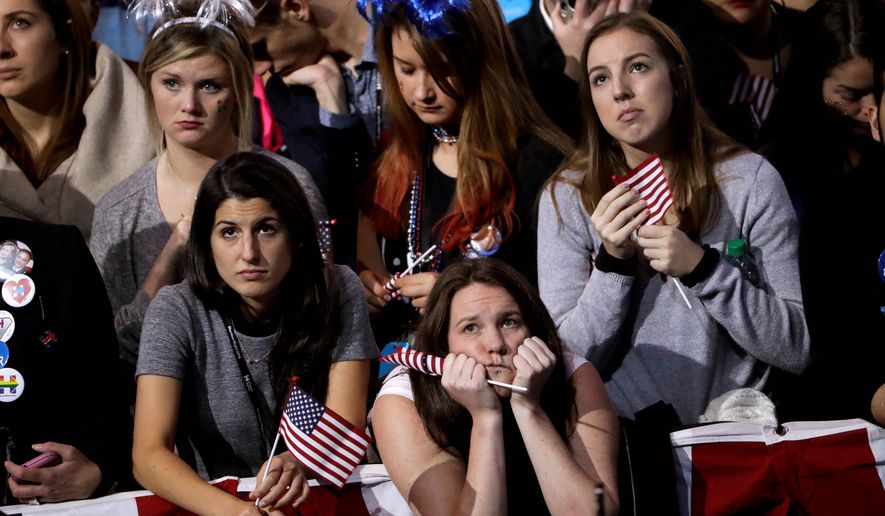NEWS AND OPINION:
There is considerable hubbub in the global press about the existence of “Trump Anxiety Disorder,” as recently reported by the Canadian Broadcasting Corporation.
The news organization cited the work of several therapists, including Elisabeth LaMotte, a clinical social worker and psychotherapist in the DC Counseling & Psychotherapy Center in the nation’s capital. She has treated patients who had “collective anxiety” and fearfulness over President Trump and his administration, also noting that Trump supporters often had feelings of isolation.
The report was immediately quoted in dozens of news accounts worldwide, ranging from Fox News Channel and the Christian Post to Zimbabwe’s Daily Sun and Tages-Anzeiger, a Swiss newspaper. But wait. We’ve seen this syndrome before, and it also proved a mighty popular theme for journalists.
During the 2016 presidential election, the press obsessed about “pre-election stress disorder,” “post-election stress disorder,” “collective stress,” “election anxiety,” “election-related stress,” “Trump trauma” and other interesting conditions found among those Americans who had not come to terms with Mr. Trump’s campaign and unexpected victory.
But those conditions appeared to dissipate. Four months after Mr. Trump took office in 2017, the American Psychiatric Association polled the nation on the subject of toxic politics. At the time, here’s what they found.
“Americans are split on whether they are anxious about the impact of politics on their lives (51 percent are, 49 percent are not),” reports the organization. “However, relatively few, 16 percent, say they are extremely anxious and that number is fairly consistent among all age groups, income levels, and among Caucasians, blacks and Hispanics.
“Democrats reported heightened levels of anxiety about the impact of politics on daily life — 62 percent of Democrats are extremely/somewhat anxious about the impact, compared to 44 percent of Republicans,” the association noted at the time.
The poll also found that 41 percent of the respondents said their anxiety level had not changed in the year previous to Mr. Trump’s victory, while 36 percent were more anxious and 20 percent less anxious.
WARNING ABOUT TRIGGER WARNINGS
“A recent study by Harvard University psychologists suggests that the very thing academics use to protect their students from possible trauma may actually end up harming them,” reports The College Fix, which monitors the cultural leanings of the nation’s campuses.
It’s all in the power of suggestion perhaps, particularly when college professors issue protective “trigger warnings” to students who are about to read or see something which might upset them. In the Harvard study, those students who got warnings were more likely to report they were anxious in the aftermath.
The researchers found that such trigger warnings can increase “perceived emotional vulnerability to trauma, and peoples’ belief that trauma survivors are vulnerable.” The warnings can also enhance perceptions that exposure to the written materials can be “harmful.” The findings were published in the Journal of Behavior Therapy and Experimental Psychiatry.
WHAT AWAITS IN FLORIDA
President Trump journeys to Tampa, Florida, on Tuesday for a jumbo Make America Great Again rally at the Florida State Fairgrounds. The event marks his 36th rally in the Sunshine State, and his eighth in Tampa itself. Protesters, however, will be waiting for him.
“Trump will be in holding a rally in Tampa because he wants to choose our next governor — and we’ll be there to tell him we’ve had enough of him, and we don’t need one of his puppets,” the Florida Democratic Party advises.
Jeff Greene, a Democratic gubernatorial hopeful in Florida plans to show up his personal campaign bus, complete with a banner reading “Trump’s Worst Nightmare” and a theatrical-grade sound system — this according to the Tampa Bay Tribune.
Current and former students at Tampa Bay Technical High School also will demonstrate at their school, one of Mr. Trump’s official stops during his visit. The students have organizational help from NextGen Florida, a progressive activist group.
“Every good protest needs a pre-protest sign making party. Join NextGen Florida at our office where we will have food, drinks and all the supplies you could possibly need to make snarkiest sign you can!” the group advised the young rally goers.
HOME DECOR
“I love waking up and remembering that Donald Trump is president.”
— Motto on new “Trump MAGA Mug,” now on sale at Donaldjtrump.com, President Trump’s official campaign site.
A CASE FOR VOTER ’COMMUNITIES’
Both Republican and Democratic strategists scramble to identify potential voters with effective and persuasive messaging — and ultimately win their support. Intricate demographics and micro-targeting may not be enough, however. Adweek points out that Netflix — which boasts 130 million subscribers in 190 nations — has developed an entirely different approach, and it’s paid off.
“The company says it has thrived by programming not to demographics but what it calls ’taste communities.’ Netflix’s scientists have found that there are several connections between content types and what people like to watch, which goes ’several layers deeper’ than genres. They refer to these as taste communities, and have identified 2,000 of them,” Adweek notes.
“We found that demographics are not a good indicator of what people like to watch,” said Cindy Holland, vice president of Netflix original programming.
In this day and age, standard demographics may not be a good indicator of how people like to vote either.
POLL DU JOUR
• 85 percent of American approve the legalization of marijuana for medical purposes.
• 80 percent say it should be “regulated like other medicines” with FDA oversight.
• 69 percent say “benefits” of medical marijuana “outweigh the risks.”
• 57 percent would be concerned that children and pets could find marijuana intended for medical use.
• 57 support legalization of marijuana for recreational purposes.
• 53 percent say if recreational marijuana is legalized, fewer people would die from opioid overdoses.
Source: A HealthDay/Harris Poll of 2,020 U.S. adults July 12-16 and released Monday.
• Observations and chatter to jharper@washingtontimes.com
• Jennifer Harper can be reached at jharper@washingtontimes.com.




Please read our comment policy before commenting.